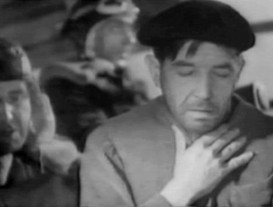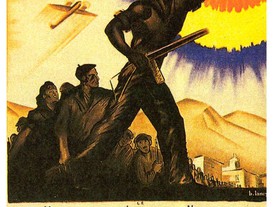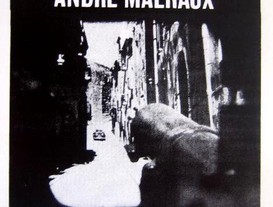André Malraux
1938.
France.
vo Castellà.
70’
El novel·lista, intel·lectual i polític André Malraux va dirigir el 1938 la seva única pel·lícula, Espoir. Sierra de Teruel, un valuós document sobre l'actuació del bàndol republicà durant la Guerra Civil espanyola. Rodat a Barcelona i Montserrat, el film va ser prohibit pel règim franquista i no es va estrenar a Espanya fins al 1978. El film explica la peripècia d'un nodrit grup de combatents republicans, que tenen el ferm propòsit de frenar l'avanç de les tropes nacionals. Per fer-ho, planegen bombardejar un pont de la carretera de Saragossa, prop del poble de Linás. Amb l'estreta col·laboració de pagesos de la zona, l'escamot de soldats intenta mantenir vives les forces i se sobreposa als continus bombardejos i a la dura i continuada oposició del poderós enemic.
André Malraux (París, 1901 – Cretéil, 1976), figura admirada i influent de la intel·lectualitat francesa i declarat antifeixista –després de la Segona Guerra Mundial, ministre de l'Interior i de Cultura dels governs de Charles De Gaulle– va combatre amb el bàndol republicà a l'inici de la Guerra Civil espanyola. Després de patir diverses ferides de guerra, va decidir canviar d'estratègia i emprendre una croada intel·lectual contra l'exèrcit nacional. Primer va viatjar a Nord-amèrica per difondre el pensament republicà i després va tornar a Espanya, decidit a dur a terme un ambiciós i molt compromès propòsit fílmic. Malraux volia adaptar la seva novel·la ‘Espoir' i retratar la campanya bèl·lica sobre la serra de Terol. El novell director, que va comptar amb la inefable ajuda de Max Aub en el guió i adaptació del seu propi original, volia rodar el film a França, però li va ser impossible per la manca de finançament. Així doncs, va traslladar l'equip a Barcelona i Montserrat, on va rodar el film entre principi del 1938 i la caiguda de Barcelona, just un any després. El rodatge de ‘L'Espoir' va ser tota una odissea, ja que l'equip havia de fer front a les inclemències pròpies de la guerra que retratava. Els bombardejos els deixaven sense llum i sense mitjans per protegir-se del foc enemic. La filmació de les escenes aèries topava amb la seriosa oposició dels avions nacionals, disposats a fer caure un avió que en lloc de metralladores duia una càmera de cinema. Malraux va comptar amb la col·laboració d'extres i figurants per fer de combatents i pagesos, la majoria dels quals eren camperols del Prat de Llobregat, localitat molt propera als exteriors que acollien el rodatge del film. Vist avui dia, ‘L'Espoir/Sierra de Teruel' és un valuosíssim document històric i fílmic en què Malraux –en l'única incursió que va fer en el cinema– mostra un extraordinari domini del llenguatge cinematogràfic, de l'el·lipsi i el simbolisme com a irrenunciables armes estètiques i una insòlita expressivitat lírica tant en el retrat dels personatges com en les escenes bèl·liques més exigents. Amb tot, i malgrat les evidents virtuts artístiques, el film de Malraux és un claríssim document propagandístic del bàndol republicà que contrasta amb els films d'ideologia contrària produïts per Cifesa i tan de moda els anys immediatament posteriors a la Guerra Civil com ara ‘Escuadrilla' (1941), d'Antonio Román; ‘¡Harka!' (1941), de Carlos Arévalo, i ‘A mí la legión' (1942), de Juan de Orduña, gairebé sempre protagonitzats per l'actor Alfredo Mayo.


